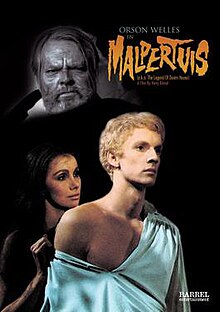Malpertuis (released in the US as The Legend of Doom House) is a 1971 Belgian fantasy horror film directed by Harry Kümel, based on the 1943 novel of the same name. It was selected for the official selection and was presented "in competition" at the 1972 Cannes Film Festival. A Flemish "director's cut" version was released in 1973.[1][2]
| Malpertuis | |
|---|---|
 Film poster | |
| Directed by | Harry Kümel |
| Written by | Jean Ferry |
| Based on | Malpertuis by Jean Ray |
| Produced by | Paul Laffargue Ritta Laffargue Pierre Levie |
| Starring | Orson Welles Susan Hampshire Michel Bouquet Mathieu Carrière Jean-Pierre Cassel Daniel Pilon Walter Rilla Dora van der Groen Charles Janssens Sylvie Vartan |
| Cinematography | Gerry Fisher |
| Edited by | Richard Marden |
| Music by | Georges Delerue |
Production companies | Artemis Film Les Productions Artistes Associés |
| Distributed by | Premier Releasing |
Release date |
|
Running time | 119 minutes |
| Countries | Belgium France West Germany |
| Languages | Dutch French English |
Plot
editJan (Mathieu Carrière), a young sailor, returns to land, and while searching for his childhood home, is mysteriously abducted. He awakens in an isolated old mansion called Malpertuis, where he find himself among various relatives, including his sister Nancy (Susan Hampshire), as well as a strange taxidermist and a resident madman called Lampernisse (Jean-Pierre Cassel). The mansion turns out to be a labyrinth of corridors, staircases, and secret chambers, belonging to his family.
His bedridden occultist uncle Cassavius (Orson Welles) is about to divide the estate among his heirs, but, as it turns out, only if they commit themselves never to leave the premises. They find themselves trapped in a mystery where they enact gods from Greek mythology, which Cassavius believes them to be, while anyone who tries to escape is found horribly murdered. The plot remains obscure to the end, as Jan tries to unravel the mystery, and seems to spiral into a dreamlike madness.[3]
Cast
edit- Orson Welles as Cassavius
- Susan Hampshire as Nancy / Euryale / Alice (Alecto) / Nurse / Charlotte
- Michel Bouquet as Dideloo
- Mathieu Carrière as Jan
- Jean-Pierre Cassel as Lampernisse
- Daniel Pilon as Mathias Crook
- Walter Rilla as Eisengott
- Dora van der Groen as Sylvie Dideloo
- Charles Janssens as Philarette
- Sylvie Vartan as Bets
Versions
editThe English language version of the film that premiered at the 1972 Cannes Film Festival was 100 minutes, as it had been edited by the American distributor from the original 1971 version, and retitled The Legend of Doom House. It was subsequently edited further by other distributors. The Royal Belgian Film Archive, together with director Harry Kümel, worked to restore the uncut Flemish version of the film, which was released in 1973 as "the director's cut". This version is 20 minutes longer, containing scenes of the film which had been edited out. Although this version is more complete, the original voice of Orson Welles is missing from it.[4][3]
Reception
editThis section needs expansion. You can help by adding to it. (July 2018) |
Neil Smith of the BBC gave the film 2/5 stars, calling it "Bizarre, lurid and baffling".[4] Michael Barrett from PopMatters rated it 7/10 stars, calling it "ragged and dizzy, full of sharp zooms and frantic cuts."[5] On his website Fantastic Movie Musings and Ramblings, Dave Sindelar called it "[a] disorienting, slightly disturbing and sometimes infuriating movie"[6]
See also
editReferences
edit- ^ "Festival de Cannes: Malpertuis". festival-cannes.com. Retrieved 13 July 2017.
- ^ "25ème Festival International du Film - Cannes". cinema-francais.fr (in French). Retrieved 13 July 2017.
- ^ a b "Wild Realm Reviews: Malpertuis". weirdwildrealm.com. Retrieved 13 July 2017.
- ^ a b "Movies - Malpertuis (1971)". BBC. Retrieved 13 July 2017.
- ^ Barrett, Michael (1 August 2007). "Malpertuis". PopMatters. Retrieved 11 July 2018.
- ^ Sindelar, Dave (5 August 2015). "The Legend of Doom House (1971)". FantasticMovieMusings.com. Retrieved 11 July 2018.